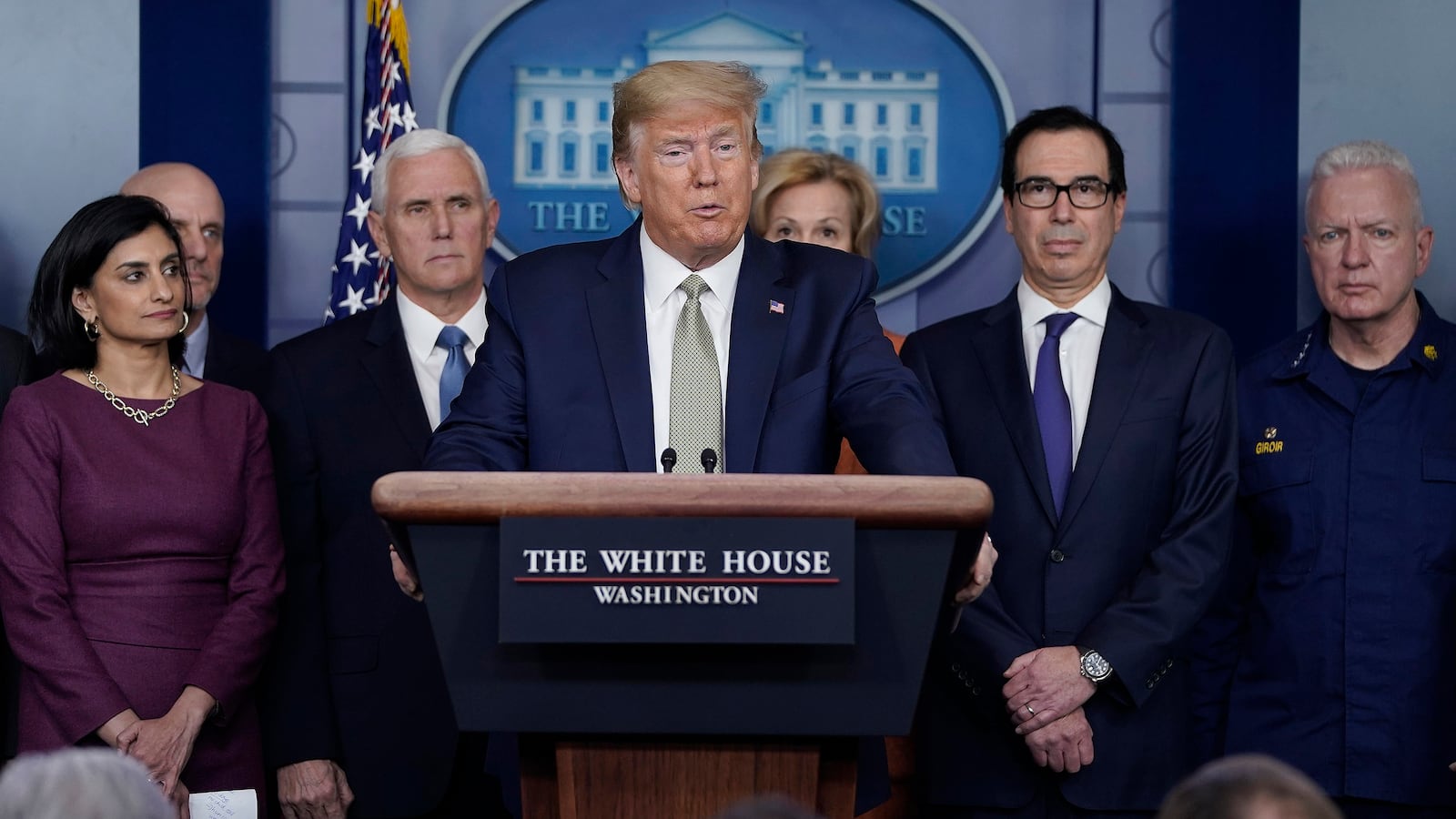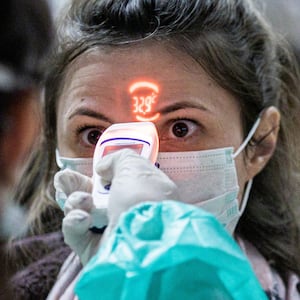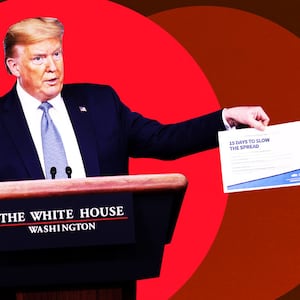Treasury Secretary Steve Mnuchin said Tuesday he is working on a “very significant economic stimulus plan” to present to Senate Republicans as the novel coronavirus pandemic sends much of the U.S to a grinding halt.
He said the plan will involve sending a check to every American worker within two weeks rather than implementing a payroll tax holiday, which President Trump had previously favored—but which the administration said on Tuesday would take too long to flow through to workers.
“What we’ve heard from hard-working Americans, many companies have now shut down whether it’s bars or restaurants. Americans need cash now,” Mnuchin said during a Tuesday briefing by the Trump administration’s coronavirus task force. “And I mean now as in the next two weeks.”
While not saying how big the stimulus package would be, he said it would also include payments to small businesses and loan guarantees to critical industries like the airline industry, which he said had been hit “worse than 9/11.” He was working with Senate Republicans on Tuesday to pass legislation “very quickly,” he added.
“You can think of this as something like business interruption payments for the American workers,” he said.
Mnuchin would not confirm reports that the economic stimulus package would be worth $850 billion—he said the number was likely to be less. He said the administration “like” the idea of a one-off check around $1,000, which would possibly be income tested.
“We don’t need to send people who make a million dollars a year checks,” Mnuchin said.
He also announced that IRS payments across the country could be deferred for 90 days.
“We have an entire package, and we’ll be laying out those details later today,” he said.
There have been nearly 4,500 confirmed cases of coronavirus and 88 deaths in the U.S., according to the Associated Press’ latest figures.
On Monday, Trump struck a far more somber tone, acknowledging that the pandemic will affect the U.S. for at least four to five months.
The task force issued 15-day guidelines on Monday that effectively shut down swathes of the country. The guidelines said, in part, that states with evidence of community transmission should close bars, restaurants, and places where large groups congregate. They also called on all Americans to avoid gatherings of more than 10 people.
“We are asking every single American to really ensure that you’re following these guidelines,” Dr. Deborah Birx, the White House Coronavirus Task Force Response Coordinator, reiterated on Tuesday.
“Every single generation has a role to play. We’re asking our older generation to stay in their homes... We’re asking the younger generations to stop going out to public places, to bars and restaurants, and to stop spreading the virus onto knobs and countertops.”
Trump emphasized the importance of following the task force’s guidelines, noting that if people don’t help flatten the outbreak’s estimated epi curve, “a lot of people are going to die.”
The president also announced on Tuesday that the task force will enact a “dramatic” and “historic” expansion of Medicare telehealth services across the country in an effort to battle the rapidly spreading pandemic.
“Testing is happening all over the country,” said Vice President Mike Pence. “But you don’t need the results of testing to know what you need to do.”
Trump said the inability of the government to provide enough accurate diagnostic testing kits to the American public is now going to be fixed with a “tremendous testing capacity.”
Anthony Fauci, director of National Institute of Allergy and Infectious Disease, previously and publicly acknowledged the mistake during a House Oversight Committee Hearing last week: “It is a failing. I mean, let’s admit it.”
On Tuesday, despite those previous acknowledgments, Fauci lauded the “comprehensive approach” the task force had since taken.
“We’ve never had a situation where [we’ve had] the mobilization of all the different components—travel restrictions, internal containment, mitigation, financial assistance, public health assistance, testing,” he said. “But we can’t do this without the young people cooperating. Please cooperate with us.”
Pence said the task force would move fast on its priorities: testing, prevention, and supplies. “I’m pleased to report that testing is available in all 50 states, and now state health authorities can authorize labs in their state and expand existing testing capabilities,” he said.
In that vein, Trump added that the U.S. Senate will soon take up coronavirus legislation, which is set to include “free testing for those who need it, as well as paid sick leave and family medical leave for the virus.”
“Today we’re also announcing a dramatic expansion of our Medicare telehealth services,” said Trump, calling it a “historic breakthrough.”
“This has not been done before,” he said. “We encourage everyone to maximize use of telehealth to limit exposure to the virus.”
“We have to fight that invisible enemy,” Trump added.
Seema Verma, Administrator of the Centers for Medicare and Medicaid Services, said telehealth had been made widely available to ease the strain on the public health system.
“Medicare beneficiaries across the nation, no matter where they live, will now be able to receive a wide range of services via telehealth,” she said. “This shift is very important for clinicians and providers who over the coming weeks will face considerable strain on their time and resources.”
Pence said the U.S. was urging all construction companies to donate their N95 masks to the healthcare sector, which had expressed concern that they would soon run out of much-needed supplies.
“One day, we’re going to be standing up here saying ‘We won,’” added Trump.
“We want to have as few deaths as possible,” he continued. “I think we’ve done really well. The best thing we can do is get rid of the virus.”
The coronavirus pandemic has also thrown the upcoming 2020 presidential election into disarray, forcing several Democratic primaries to be postponed. When asked whether he was prepared to make decisions now that will ensure elections are able to occur, Trump said: “An election is a very special thing.” He said that getting the virus under control in the next few months will, hopefully, eliminate those concerns.









